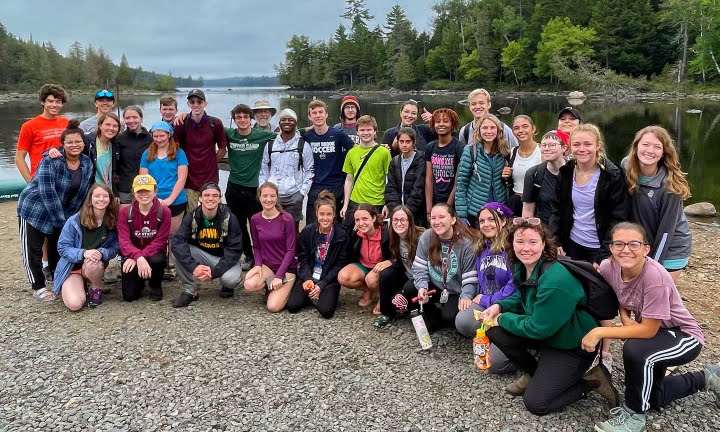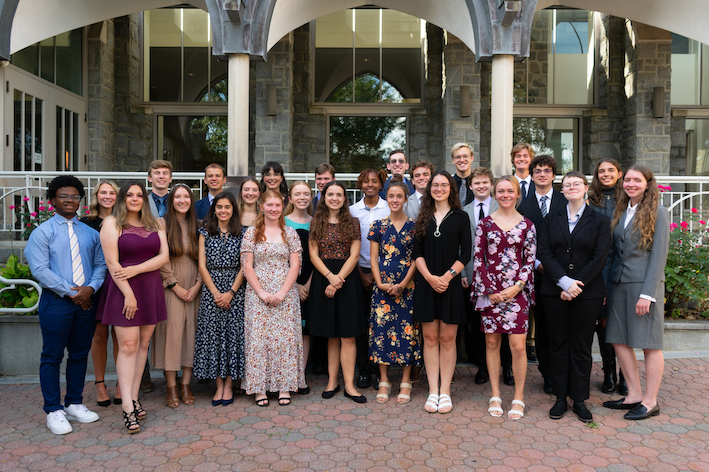Dear freshman cohort of the Templeton Honors College,
On behalf of the sophomore cohort and the entire Templeton community, we welcome you to the honors college: home of the nerds, the quiet bookworms, the energetic idea machines, the creative writers and future nurses, the overthinkers and the underthinkers who needed scholarship money and got way more than they bargained for. Whoever you are and whatever you have to offer, we welcome you to this diverse but Christ-centered community of learners and lovers of wisdom, otherwise known as philosophers.

Three weeks ago you returned from a five-day, mountainous induction into the classical great books tradition. You’ve heard Dr. Williams recite “Ruminant” by Scott Cairns, and no doubt you’ve started to recite it from memory. You’ve read The Odyssey together and talked about Telemachus’ journey to adulthood, a journey that you have or will soon encounter yourselves. You’ve talked about talking and cooking the world together! Like Telemachus, you have been thrust into a voyage endeavoring to set your sails, into a wilderness hiking with a bunch of strangers, into a great abyss that the poets called the Unknown. You’ll soon find, if you have not already, that classes are very much the same. Your Templeton classes are driven by the courage and will to brave the Unknown; to restore order in a world descending into chaos; to strip away the messy, convoluted dissimulations thrust upon us; to pursue truth for the sake of truth.
You walk into The Good Life having read Book One of Aristotle’s Nicomachean Ethics. If you’re lucky, you understand 15% of it. Aside from that, you walk into class and it’s you, your book, and your peers (who are just as lost as you are) against the rest of the world. As you study Nicomachean Ethics, you will learn about the four cardinal virtues: prudence, temperance, courage, and justice. The ancient Greeks praised prudence as the highest of the cardinal virtues. Last fall, a wise man named Dr. Gary Jenkins asked the freshman cohort during their first West Civ class a seemingly simple question: what is virtue? We poked and prodded, and we got relatively close. But we were all wrong. The English word for “virtue” is derived from the Latin “virtus,” meaning strength or courage. Virtue isn’t all about morality and knowing the right thing to do. It’s about having the guts to go through with it, and to build a habit of doing the right thing over and over again.

ceremony.
It’s true, we receive an education to learn and to cultivate wisdom. But the honors college has challenged me to think even bigger than that. It’s one thing to know how to live the good life. It’s another thing to develop the strength and courage to actually live it. Wisdom without the courage to act accordingly is useless. My academic career has introduced me to what I call intellectual courage. Sure, this can mean the courage to vocalize your opinions in class. But it can also mean the courage to listen, maintaining a posture of openness to changing your mind. It means the courage to risk being wrong, to misinterpret the text, to miss certain points the author is trying to convey, and to learn from these failures. But perhaps more than anything else, intellectual courage means the courage to be transformed by these great works of literature. To not only allow them to inform your ideas but to inform the way you live.
This transformation will be uncomfortable, perhaps even painful. It will feel foreign. It’s supposed to feel that way. Education awakens us to the reality of the inexhaustible complexity of our world compared with the world we knew as children, and greater still the reality of the world we were born to inherit. The universe is shrouded in mystery that we, as philosophers, must summon the courage to unveil. In Orthodoxy, G.K. Chesterton explores our need as humans to “view the world as to combine an idea of wonder and an idea of welcome” and “to be happy in this wonderland without once being merely comfortable” (15). While we embrace the foreignness and the discomfort of journeying through this strange terrestrial existence, we are not altogether lost. We belong in this world because we are human, made in the image of the Creator of the universe. Likewise, Templeton welcomes you because you belong here. I urge you to arm yourselves in God’s righteousness and summon the courage to represent His image and that of the Templeton Honors College with excellence.
Your sister in Christ,
Sylvie








